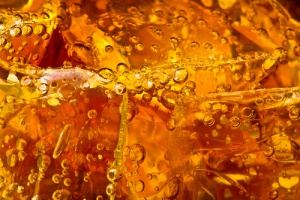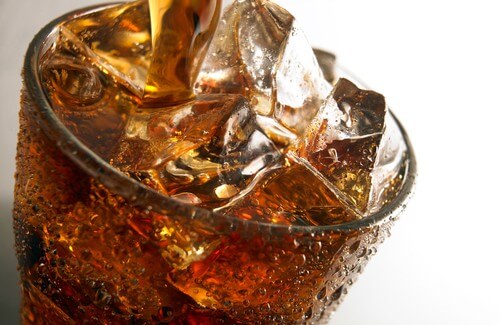How Do Carbonated Beverages Affect Health?


Reviewed and approved by the doctor José Gerardo Rosciano Paganelli
How refreshing, sweet, and tasty is a Coca-Cola on a terribly hot day! The bubbles attract you and make you drink these kinds of drinks day after day. This makes a lot of people ask themselves how can this habit be bad if they’ve heard that carbonated beverages have a lot of energy.
You should know that the most recent scientific studies state that carbonated beverages can be dangerous. Do you want to delve deeper on this subject? Read on!
What are carbonated beverages?
The process of making carbonated beverages is very simple. You just have to mix filtered water, carbon dioxide, sweeteners (substances that make it sweet), and acidulants (substances that modify or control acidity).
This mixture gives way to a refreshing soda that you can drink anywhere. However, these drinks were first used in the pharmaceutical industry as tonics to relieve headaches and indigestion.
Read more here: Make Your Own Sweetener: How to Grow Stevia at Home
Many years have passed since then. Nowadays, there are many varieties of carbonated beverages. They have different colors, smells, and tastes but they’re all fizzy and flavorful drinks without alcohol. But just how healthy are they? Are the old concepts still valid? Unfortunately, no. These drinks are very harmful.
If you’re still in doubt, we’ll show you the various symptoms you may experience if you consume too many carbonated beverages.
Symptoms of excessive consumption of carbonated beverages
- Headaches
- Trembling
- Cardiac arrhythmia
- Anxiety
- Sleeping problems or insomnia
- Depression
- Nausea and vomiting
- Frequent urination
- Bone loss (due to low calcium absorption)
- Loss of appetite
How do carbonated beverages affect health?
There are many studies that show the negative effects of many products we consume, including carbonated beverages.

The nervous system
Many of these drinks contain a lot of caffeine. Caffeine is an alkaloid that has stimulating effects on your nervous system and heart, which is why it stimulates your state of wakefulness and resistance to fatigue. It’s also a powerful vasodilator, but that’s where its benefits end.
An excessive consumption of caffeine causes dependence, headaches, cardiac arrhythmia, insomnia, and anxiety. These are the same symptoms you experience when you drink too much coffee or tea.
Carcinogenic effect
Carbonated beverages have an attractive taste and color. They take a long time to go bad because they have a lot of conservatives, acidulants, and chemical additives. These substances can harm your kidneys. In addition, they tend to build up in your tissues, which causes cancerous cells to appear.
Don’t think that you should drink them just because they contain antioxidants. Your body only needs natural antioxidants that you can find in fruits and vegetables.
Increases reflux during digestion
Contrary to what was believed in the past, carbonated beverages can have a negative effect on the digestive process. The carbon dioxide in these drinks increases the acidification of gastric juices and accelerates their production, which also accelerates digestion but causes acid reflux, acidity, and absorption problems. These can be extremely painful for people who suffer from gastritis and stomach ulcers.
Cause cavities
Carbon dioxide and sugar in sodas affect our mouth and teeth because they alter your taste buds, corrode tooth enamel, and cause cavities.
This may interest you: How to Treat and Prevent Cavities the 100% Natural Way
Cause obesity
In general, carbonated beverages have a high concentration of sweeteners. Some of them have high or low caloric content (1 glass can have 3 or 4 tablespoons of sugar). The ones that have a low caloric value are sorbitol, aspartame, and saccharine, while the sweeteners that are high in calories are sucrose and glucose.
Excess consumption of these sugars can spike blood sugar levels and cause pancreatic inflammation and diabetes.
On the other hand, carbohydrates that aren’t converted into energy through metabolic processes start building up in the tissues and arteries. This can lead to obesity and atherosclerosis.
Bone loss
As if that weren’t enough, the acids and caffeine in these drinks harm bones because they interfere in the absorption of calcium. This weakens your bones and promotes osteoporosis. On the other hand, the combination of sugar and acid makes the absorption of iron in cells difficult. This can cause anemia and make you susceptible to different kinds of infections.
Be careful with diet sodas
If you want to prevent weight problems and diabetes, drinking diet soda isn’t enough. You should be warned that sweeteners shouldn’t be overly consumed either because they interfere with different metabolic reactions and can cause brain damage, memory loss, and even promote the development of neurodegenerative diseases like Alzheimer’s.
Lastly…
Although these carbonated beverages are delicious, we recommend that you drink water, juices, and smoothies instead to stay healthy. This tip is especially meant for pregnant women and people who suffer from nervous problems, breast problems, gastric ulcers, cardiovascular problems, hypertension, and migraines. These are the people who are most at risk.
Remember that health and happiness go hand in hand!
All cited sources were thoroughly reviewed by our team to ensure their quality, reliability, currency, and validity. The bibliography of this article was considered reliable and of academic or scientific accuracy.
- Vartanian, L. R., Schwartz, M. B., & Brownell, K. D. (2007). Effects of soft drink consumption on nutrition and health: a systematic review and meta-analysis. American journal of public health, 97(4), 667–675. https://doi.org/10.2105/AJPH.2005.083782
- Anjum, I., Jaffery, S. S., Fayyaz, M., Wajid, A., & Ans, A. H. (2018). Sugar Beverages and Dietary Sodas Impact on Brain Health: A Mini Literature Review. Cureus, 10(6), e2756. https://doi.org/10.7759/cureus.2756
- Chazelas, E., Srour, B., Desmetz, E., Kesse-Guyot, E., Julia, C., Deschamps, V., Druesne-Pecollo, N., Galan, P., Hercberg, S., Latino-Martel, P., Deschasaux, M., & Touvier, M. (2019). Sugary drink consumption and risk of cancer: results from NutriNet-Santé prospective cohort. BMJ (Clinical research ed.), 366, l2408. https://doi.org/10.1136/bmj.l2408
This text is provided for informational purposes only and does not replace consultation with a professional. If in doubt, consult your specialist.








